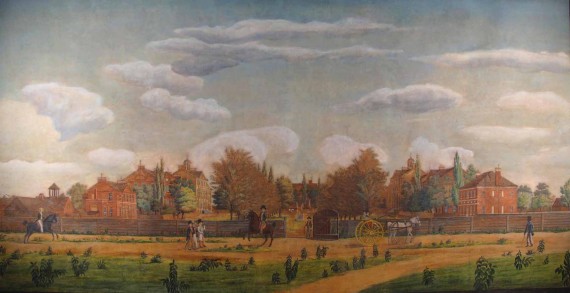
The Abbeville Institute conducted three conferences this year on the fracturing of American national identity and what means for the Southern tradition and the Southern people. The general public knows America is coming apart and that they’re anxious about it, but most don’t understand why because our political leaders and the national media generally suppress its origins. We wanted to provide context and meaning.
Our February conference in Charleston, South Carolina focused on “The Attack on Confederate Monuments and its Meaning for America,” and our November event in Dallas, Texas discussed “The Revival of State Nullification and Secession.” Each event featured both our own Abbeville Institute scholars as well as distinguished faculty and guests from around the world, including Marco Bassani, distinguished professor of political thought at the University of Milan, Italy; Michael Kogan, professor of philosophy, emeritus, Montclair University, Montclair New Jersey; Congressman Ben Jones, alias “Cooter” of the Dukes of Hazard TV series; Dr. Allen Mendenhall, Associate Dean and Executive Director the Blackstone & Burke Center for Law & Liberty at Faulkner University in Montgomery, Alabama; Michael Boldin, Founder and Director of the Tenth Amendment Center in Los Angeles, California; former Oklahoma “abolitionist” legislator Dan Fisher who this summer ran for governor in the Republican primary on a strong state sovereignty platform dedicated to the elimination of abortion in his State; and Marcus Ruiz Evans, founder of the progressive California secession movement “CalExit.”
Our
Since our conferences in 2018 were on the coming apart of American national identity, it’s appropriate to the end the year with some reflections on that topic. After 15 states peacefully seceding from the Soviet Union in 1991, John Updike famously asked, “without the cold war what is the point of being an American?” A good question. Is American identity based on a historic self-sustaining culture, or has it been held together by the constant centralization demanded by War: the Spanish American War, World Wars I and II, the Cold War, Korea, Vietnam, Iraq, Afghanistan, Syria? War, Randolph Bourne said, is the “health of the state.”
The Jeffersonian America that existed from 1776 to 1860 was not a unitary state “one and indivisible” as it was said to be after 1865. Just as the European Union is a federation of nations and not itself a nation, so the pre-Lincolnian America was a federation of sovereign states and not itself a nation state. The closest thing to a “national” identity were state and regional identities. Tocqueville said that in federating the states had not forfeited their distinct “nationality.” Everyone understood this. An early 19th century New England poem reads:
Amy Kitteridge is my name,
Salem is my dwelling place
New England is my Nation
And Christ is my salvation.
But the America that emerged after the Union victory in 1865 did claim to be a unitary nation state “one and indivisible” from which secession would be unthinkable. It is that America that is coming apart. How are we to understand this?
We might begin by paying attention to George Kennan, who framed the policy for “containing” the Soviet Union, was a life-long fellow of the Institute for Advanced Studies at
In 1960, the US was at the height of its prosperity and prestige. Although the size of a continent, it was unified by a common language and a common Anglo-Protestant political, moral, and religious culture established by the English settlers in the 17th century. To protect that culture, immigrants from western Europe were favored as being the easiest to assimilate. When populations from Eastern Europe and Russia seemed to unbalance that culture, immigration was virtually shut down for some 40 years to allow assimilation.
It resumed in 1965 but dropped its policy favoring cultural assimilation. Henceforth some 90 percent of immigrants would come from the third world. America, it was said, should “look like the world” and become the first “universal nation.” This occurred with the rise of political correctness and its charge that America is structurally a white supremacist society. Immigrants were encouraged to retain their culture and language. And immigration laws were not substantially enforced. By some estimates the number of illegal immigrants today could be as high as 20 million. If so, that is more than all the Germans, Italian, Irish, and Jews who immigrated in the past 400 years.
The result has been an ethnic demographic revolution unequaled anywhere in the world. In 1960, 85 percent of Americans were of white European descent, 11 percent were black, and Hispanics were a mere 3.5 percent. Estimates today are that by 2040 whites will be a minority of around 47 percent, Hispanics will be 30 percent, and blacks will be 13 percent. The great majority of Hispanics are from Mexico. Of all immigrant groups, Mexicans are at the bottom in education, entrepreneurship, desire to assimilate, or even to seek citizenship.
In California and South Florida, there are Hispanic communities totaling around 3 million each where 66 percent speak Spanish on a regular basis. Each community is the size of Uruguay or larger than Lithuania. Arabic is an official language in Michigan. In time, these communities could become virtually independent states. Thirty percent of Dearborn, Michigan is Islamic, and there is persistent demand for the incorporation of Sharia law. Some two hundred languages are taught in Chicago schools. This is not to demean these communities, but merely to point out that they do not identify with the Anglo-Protestant culture that has been the cultural core of the “nation” forged by Lincoln’s victorious armies.
This fracturing is the late fruit of the mantra that America is a “multi-cultural” society, that “diversity” is our strength, and the like. To this should be added, the implacable conflict between Red and Blue states for control of central power. After Bush defeated Gore in 2000, Blue state Democratic pundits raised the question of secession. This sentiment has since filtered down to the public so that polls are regularly taken to register secession sentiment, something that had long been unthinkable.
In 2008, a Zogby poll found that 22 percent of Americans believed a state has a right to secede. In only ten years a 2018 Zogby poll, found that the number had jumped to 39 percent with 29 percent not sure. That means 68 percent of Americans are willing to consider secession. Francis Bellamy, who wrote the Pledge of Allegiance to the Flag, recorded that it was designed to explain the meaning of the War of 1861-65 which he said, “reduced to three words: one nation indivisible.” Today, a majority of Americans are open to scrapping the “indivisible” part. The debate on dividing
Whether the Union will be divided or whether it can be retained but radically decentralized only God knows. But a number of things are clear. (1) the demographic revolution America has gone through in a single generation is something no modern nation state has ever experienced and survived. Indeed, the America that flourished from 1865 to the immigration act of 1965 arguably has not survived. (2) the conflict between Red and Blue states is here to stay for the foreseeable future. A recent Reuters poll found that nearly a third of Americans believe some sort of civil war will occur within five years, and some security analysts issued similar warnings. (3) the genie of secession is out of the bottle and cannot be put back by reciting the pledge of allegiance to an “indivisible” nation. On a national level, social trust and patriotism have broken down. A 2017 Gallup poll found that only 44 percent of Americans said they were willing to fight for their country. (4) the central government is, and has long been, dysfunctional. It is incapable of reaching consensus on much needed policies, not to mention conflicts springing from runaway spending and public debt. It has entirely lost the knowledge of how to stop growing.
But what does this have to do with the Southern tradition and the Abbeville Institute? Simply this. After the War of 1861-65 a compromise was reached whereby the South would give up its Jeffersonian view of the Constitution that allowed both state nullification and secession while the North would build a new unitary
In short, we can no longer think about Southern identity (or American identity) in the 1865-1965 categories. When a country falls into such deep incoherence, as America is in today, the only way forward is to burrow more deeply into its traditions to find potentialities for renewal in some new form yet to be understood. What we call a revolution or a renaissance is usually a swerving back to recover and make new something we have forgotten, ignored, or has been suppressed. The Lincolnian large unitary state tradition that began in 1865 has exhausted its moral resources. It has lost the knowledge of how to stop growing. It knows only to centralize and build new bureaucracies.
The only part of our tradition that has anything to say about these disunited Red and Blue states, and the mosaic of conflicting cultures that are drifting toward violence, is the founding Jeffersonian tradition (1776 to 1860) which worked quite well without being a unitary nation state. It was able to check the growth of central power because it was grounded in state and local sovereignty not the fantasy of “national” sovereignty. What is needed today is political devolution, division, and separation, not more unification and centralization. How to do this in a civil and peaceful way, in a country still under the spell of “indivisibility,” is a much needed national debate.
This has been part of the goal of the Abbeville Institute since its founding in 2002. Our mission to explore what is true and valuable in the Southern tradition which encompasses the political as well as the economic, cultural, theological, and philosophical underpinnings of Jeffersonian America. Our website, conferences, and weekly podcast are the fruit of our labor–and we have more in store for 2019–but this requires your financial support. We exist on your generous contributions alone.
Please keep us in your financial plans. A
Merry Christmas and Happy New Year!






